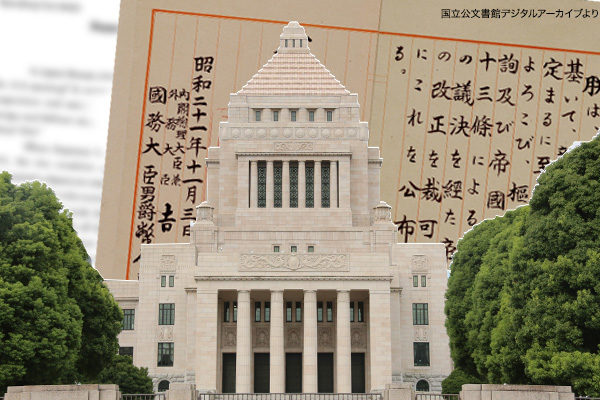Japan now has a rare opportunity to amend its constitution. The four political parties thought to be for amending the Constitution – the ruling Liberal Democratic Party (LDP), its junior coalition partner Komeito, the opposition Japan Innovation Party (JIP) and the opposition Democratic Party for the People (DPP) – have secured a two-thirds majority in each chamber of the National Diet required to propose constitutional amendments for a national referendum. The revised national referendum act to improve the convenience of the national referendum was finally enacted last June, three years after it was proposed.
Prime Minister Fumio Kishida, House of Representatives Speaker Hiroyuki Hosoda, LDP Secretary General Toshimitsu Motegi, JIP Secretary General Nobuyuki Baba and DPP Secretary General Kazuya Shimba have indicated their willingness to promote discussions on constitutional amendments. Virtually all Japanese political parties, excluding the largest opposition Constitutional Democratic Party of Japan and the Japanese Communist Party, talk about constitutional amendments. JIP’s Baba complained to reporters that the constitutional research commissions in the two National Diet chambers are not working. Many voters might have shared Baba’s complaint.
Remaining shackles of postwar occupation policy
Why did a movement for constitutional amendments fail to gain momentum when the LDP and its partner Komeito commanded a two-thirds majority required to propose such amendments under the Shinzo Abe administration? Because some LDP senior officials refused to keep pace towards the amendments, with Komeito remaining inactive.
It may not be proper to generalize any personal experience but I would like to note that I had a bitter feeling with an LDP senior official who willingly consented to a petition for constitutional amendments but went right on to another private meeting, telling the participants that it would be difficult to embark on the constitutional reform as far as such amendments are discussed only among some zealous groups and former Self-Defense Force officers. The official might have meant that it would be futile to do something unless time is ripe for doing so. Politicians preoccupied with reading the situation typically take such attitude.
An up-and-coming American scholar living in Japan is resentful in his article for the JINF Journal published by the Japan Institute for National Fundamentals. He doubts if Japan is a sovereign state when it is still bound by outdated U.S. occupation policy, unable to do anything against territorial losses, recover abducted citizens, pave the way for its prime minister’s visit to Yasukuni Shrine dedicated to the war dead, or get out of historical viewpoints based on the verdict of the Tokyo Tribunal.
Don’t leave politicians to determine the fate of the nation
Constitutional amendments, unlike ordinary legislative actions, would not necessarily produce immediate, practical effects. But the reform would represent the rejection of humiliating occupation policy shackles and send a signal to the international community that Japan would stand up as a full-fledged nation in response to any emergency and possess military forces as its national backbone. The constitutional amendments would become the most effective deterrence against neighboring countries posing threats to Japan. A message to the United States would be that Japan establishes its position as a reliable ally.
The attitude of waiting for whole national debate may be an excuse for doing nothing. The environment for constitutional amendments could have disappeared before we know it. We should not leave unfaithful politicians to determine the fate of the country. The time has come for us as the people of Japan to achieve the constitutional amendments.
Tadae Takubo is Vice President of the Japan Institute for National Fundamentals and a professor emeritus at Kyorin University.


